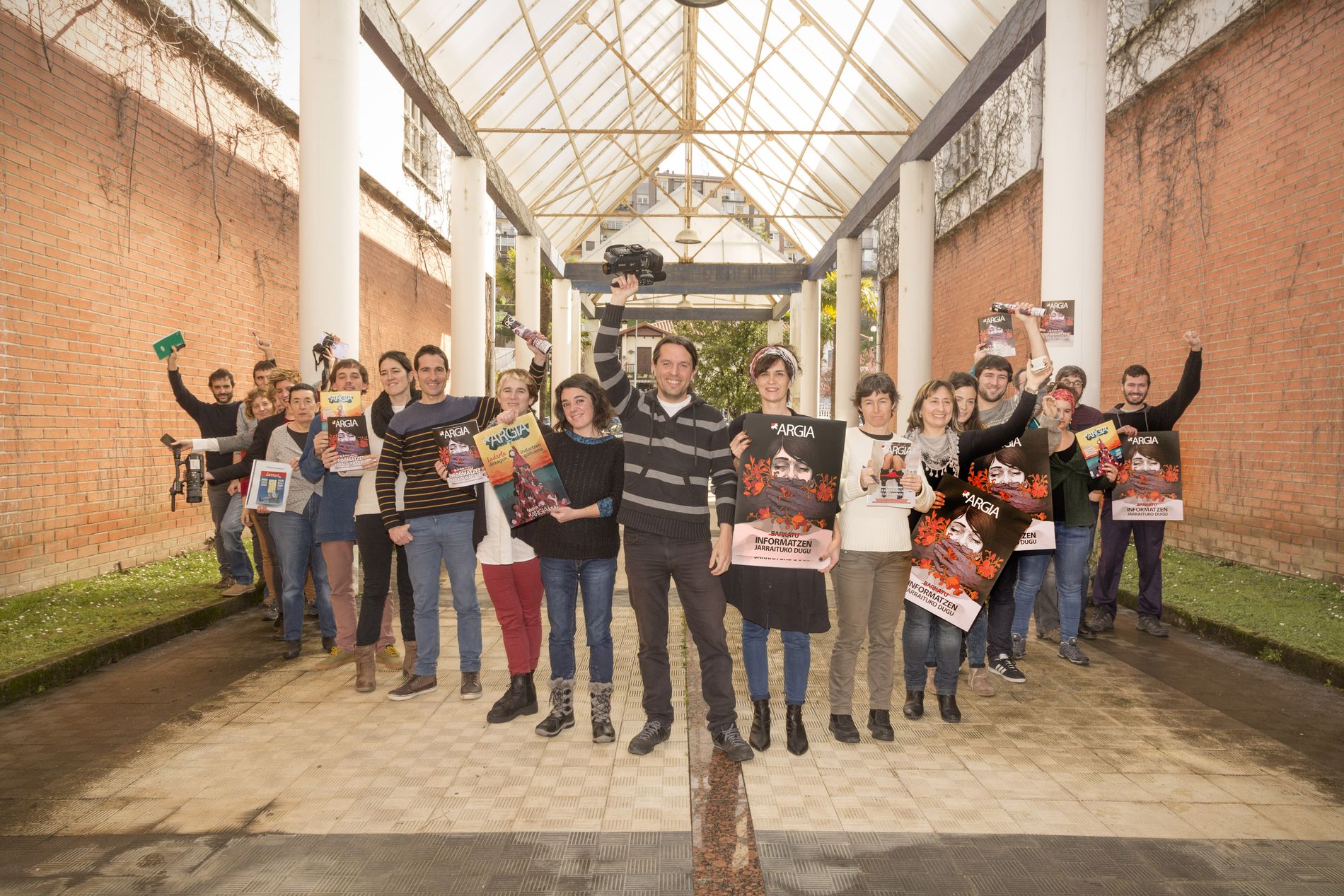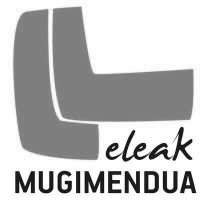If we shut up, we lose everything.
- In application of the Moorish Law we have received the first punishment. This editorial is the answer of those of us who make ARGIA.

If you calm down, there is no problem. When you decide to say you enter the slider, where you can indicate something someone doesn't like. And if speaking instead of being a private account is public, the potential problems increase as much as the number of recipients of the message. Journalists have to fight every day against “better if you don’t publish” and “I won’t make statements” and we would lie if we didn’t admit that we sometimes lose the battle.
When this happens, the trade undergoes a mutation, it is no longer a journalism, we enter the realm of public relations: journalists can become mere instruments of transmission of someone with strength to influence the media. They are silent because, although they speak, they do not have the possibility to do anything that “does not touch”.
One of the greatest difficulties in this work is the fight against power relations, value systems and dominant inertia. When we start asking questions that put us in question, we offer the best service to society.
In 2015, the Spanish Government passed a law that made it extremely difficult to do what was already otherwise difficult to do. The “Hasty Law”, which distorts the concept of citizen security, is designed to allow journalists to apply a preventive logic: first of all, to deal with the consequences. Legal experts have insisted that they do not make it clear to citizens why they can punish and why not, allowing police forces to apply their own law, as they have indicated.
“Just in case” says the common sense of the Mordaza Law
For example, Article 52 specifies that the statement by the agent who witnessed an event is sufficient to finalise. Fines for callers and promoters of unauthorized demonstrations. But is the demonstration being promoted by the journalist who posts a photo on social media to communicate it? We don't know. “Just in case you don’t,” says the new common sense that the law wants to impose. “Save that camera,” “turn off the phone,” “circulate, nothing happens here.” In Article 36, “alteration of citizen security” is described as a very serious infringement: what does this mean? To suspend the plenary session of a parliament, to protest on the street, to cut traffic? It is not specified. And it is not concrete what “disrespect” the police is: An ugly gesture? Video recording? Where does the limit apply? Who puts it?
Some of these questions have been answered at ARGIA last week: The action of journalist Axier López on 3 March was declared a crime by the Government Delegation in Gipuzkoa. The reason for the arrest was that the police acted in broad daylight on the street for spreading the photo via Twitter. It is a type of work that we have done many times and despite the difficulties, we will continue to do so, as the communication of such events is part of our normal activity. We do not believe that, as suggested in the sanction received, we have to “ask permission” from anyone to perform our work. We say that the Moorish Law is unfair, that the problem is law and not journalism, and that is why we have decided not to pay the fine and resort to the sanction.
Our journalism does not ask for permission.
This project was born without asking anyone for permission, it has known the bans and censorship, detention and torture of our colleagues. And our trajectory has taught us that the best answer we can give is to put the recorder in motion, focus with the camera, turn on the lights. Let them know. Our commitment is for those who follow the LIGHT. They are the main ones harmed by the order established by the Moorish Law. In two ways: on the one hand, it's not only an attack on ARGIA, but we understand that being a means that survives thanks to a community, this fine and the people who may come want to take away the money that they ask of all the people who support ARGIA. On the other hand, if we stopped doing our work as we have done so far, their right to information would be violated.
It gives the impression that in the first case in which the Moorish Law has been applied against a journalist, the professional who has been fined is from the Basque Country. Also in the field of communication, the place where we live has known what cannot happen in a democracy. Two closed newspapers, the journal Egin and the journal Euskaldunon Egunkaria; and the journal Egin Irratia; and the journal Ardi Beltza; as well as the web pages Gaztesarea Apurtu.org and Atea Ireki, among others. The Mordaza Law is another brand that seems smaller than those mentioned, but that will condition a lot throughout its term some forms of journalism that the powers of the Spanish State barely accept. What should you think that the first to be condemned was a means of communication published in Euskera. It was written in a single language and, of course, this is not what we use to report. The project in Basque is punished in Spanish, in that language which is not the one we use every day, in the administrative language of the government which has to read twice so that the Basques who do not know Basque can understand it. This measure, which seeks to condition the editorial line of this media, requires reflection: our involvement with the people who are working is well known, with the people who want to work but cannot, with our language, with feminism, with social movements, with the environment, with culture, with food sovereignty, with the representation of this country in its territorial integrity. It is also known that we are a company with a transformative social economy: every morning we come to a work center where workers have the word and the decision, we promote an economic model that puts life in the center as we learn.
Would they have punished us if we weren't all that?
With the support of the institutions it is possible to repeal the Moorish Law
Fortunately, the first blow of the Mordaza Act has received a response that has shocked the working team of this media by many Basques. For the quantity, we cannot respond to all the messages of support we have received in the last week, but through these lines we would like to thank everyone. Both those here and those who have come from abroad: without them the news would not reach the Associated Press, which has echoed it globally, two days after its publication. Subsequently, it has been read in major international media, such as the New York Times or the Guardian.
We should not fail to mention, however, that, despite the importance of this great echo, the involvement of the institutions of the Basque territories in which the Mordaza Act is in force is also essential. The main political parties in Hego Euskal Herria have voted against the Moorish Law, and although this is an important step towards guaranteeing freedom of expression, it is not enough. Faced with the specific applications of the law, the institutions have to react, if not, the feeling of helplessness increases among journalists. An active attitude towards this injustice is needed, because what is at stake is the right to information, one of the pillars of democracy.
In the institutions of the Basque Country there is sufficient consensus to apply the philosophy of the Foral Pass: In Madrid, the conditions must be put in place so that the law is not complied with until it is withdrawn, because, after all, the measures against the freedom of information of the Basque media are also contrary to self-government. And our institutions cannot be subject to the whims of a representative that the Moncloa has placed here.
We have been playing a lot since the entry into force of this law that cuts citizens’ freedoms. Axier López and other journalists saw it clear last year when they launched the initiative Journalism is not a crime. The forecasts that were made are being met and has become the first objective of the haste in a professional who has highlighted in the denunciation of the unjust law. It is in the hands of all and all that is the last: over and above particular interests, concrete political moments and partisan events, it is essential to defend the right that belongs to all citizens. The alternative is silence. And if we shut up, we lose everything.

Libre-Eleak mugimenduari esker eskuratu ditugu Nafarroako Gobernuaren menpeko Poliziak Mozal Legeari emandako erabileraren datuak. Hala, 2015eko uztailetik eta 2016ko abendura bitartean, Mozal Legea erabiliz, 11.000 isun jarri dituzte Hego Euskal Herriko bi Polizia autonomikoek... [+]
We will examine EAJ and PSOE's proposals for reforming the Citizen's Security Law – the Muzzle Law – in the following lines. As well as the the initiative against it taken by the Eleak-Libre organization.
There have been important results a year after we stood up to the Muzzle Law and the fine which Spanish Government
Joseba Larratxeren ilustrazioak hartu du aste honetako ARGIAren azala. Titularra, Gabriel Arestiri keinu eginez: Inoiz, inola, inon, ez gara isilduko. Asteazkenetik aurrera kioskoetan, eta Argia Jendeak etxean. Proiektua babestu nahi baduzu, hemen aukera.
Axier Lopez ARGIA-ko kazetariari epaiketaren atarian zuen isuna kentzeak Mozal Legea deuseztatzearen alde lan egiten dugun guztioi erakutsi digu posible dela lege injustuei aurre egitea. Kasu honek erakusten digu nola jokatu behar dugun injustiziaren aurrean: lehenik eta behin... [+]
Lehen ere esan genuen. Ez genuela uste, jaso genuen zigorrean iradokitzen zen bezala, inori “baimenik eskatu” behar genionik gure lana egiteko.
The Spanish government, via its Basque Autonomous Community representative Javier de Andres, has desisted from its attempt to fine ARGIA journalist Axier Lopez. As a result of the magazine's appeal against the fine, a trial was to be held in Gasteiz on March 13th. Without... [+]
























